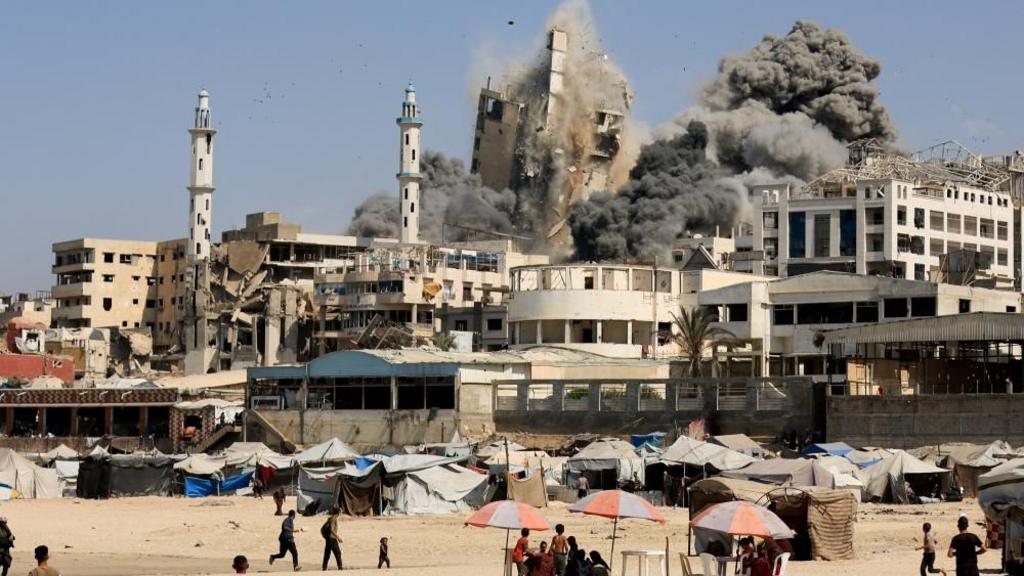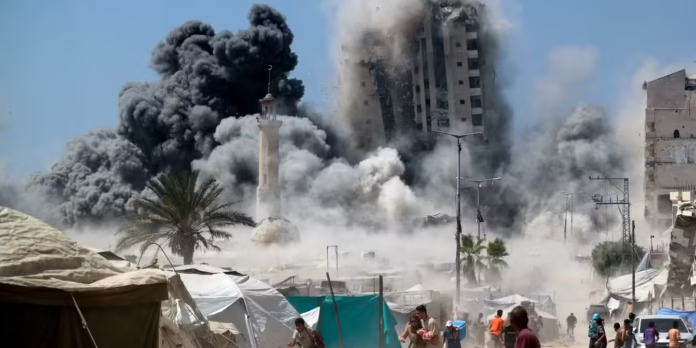Mass Exodus from Gaza City
Gaza City is witnessing one of its largest waves of displacement as thousands of families desperately attempt to escape the escalating Israeli military offensive. The Israel Defense Forces (IDF) confirmed that ground operations have officially begun, marking a significant shift in its campaign to seize control of the city — described by Israeli Prime Minister Benjamin Netanyahu as Hamas’s “final stronghold.”
Lina al-Maghrebi, a 32-year-old mother of three, said she had clung to hope of staying home in Sheikh Radwan district until she received a direct call from an Israeli officer instructing her to evacuate.
“I was forced to sell my jewellery just to afford a ride and a tent,” she said. “The journey took 10 hours, and we paid 3,500 shekels (about £735). The road was packed with cars and trucks for miles.”
Congested Escape Routes

The IDF has designated the al-Rashid coastal highway as the only safe passage for civilians. However, residents report gridlocked traffic, families stranded for hours, and overcrowded trucks as airstrikes thunder overhead. Nighttime evacuations have also become common, with vehicles inching forward under the cover of darkness in hopes of avoiding bombardments.
International humanitarian groups have warned that the situation is rapidly deteriorating. Food, fuel, and medical supplies are scarce, and the soaring cost of transportation is preventing many from leaving at all.
Global Reaction to the Offensive
The operation has drawn widespread condemnation. United Nations human rights officials have criticized the scale of the assault, and the German foreign minister urged restraint. UK Foreign Secretary Yvette Cooper went further, calling the offensive “reckless and appalling,” warning it would lead to more civilian casualties and jeopardize remaining hostages.
The United States struck a different tone, with Secretary of State Marco Rubio signaling partial support during a joint press conference with Netanyahu. While reiterating Washington’s preference for a negotiated end to hostilities, he said that “sometimes, when you are dealing with a group like Hamas, diplomacy isn’t possible.”
Meanwhile, a new UN commission report accused Israel of committing genocide in Gaza — an allegation that Israel has strongly rejected.
The Rising Cost of Displacement

Residents say the financial burden of evacuation is devastating. Renting a small truck now costs around 3,000 shekels (£630), while a simple tent for a family of five can sell for 4,000 shekels (£840). For many who have lost their jobs or livelihoods due to the war, these prices are impossible to afford.
Nivin Imad al-Din, a 38-year-old mother of five, said she fled south after leaflets were dropped on her neighborhood ordering evacuation. “I had to leave everything behind — even my furniture — because I could not afford a large truck,” she said. “It was the hardest decision I have ever made.”
Relentless Bombardment
Overnight, Gaza City endured one of its heaviest bombardments yet. Israeli warplanes targeted the al-Daraj neighborhood, the Beach refugee camp, and Sheikh Radwan with airstrikes, while artillery shells and drone fire pounded residential areas.
The IDF confirmed that it is “gradually” advancing deeper into Gaza City as part of what it calls the next phase of its offensive. The number of ground troops is reportedly increasing daily, supported by helicopters and tanks.
Displaced resident Ghazi al-Aloul said he is now sleeping outside al-Quds Hospital in Tel al-Hawa after being forced to flee again. “The bombing has been insane. Whole buildings are being demolished. We have nowhere else to go,” he said.
Entire Neighborhoods Flattened
Eyewitnesses say entire residential blocks have been reduced to rubble, leaving many dead or missing under collapsed buildings. Sami Abu Dalal, a resident of al-Daraj, described the latest assault as “the most difficult night yet.”
“Israel is pushing forward on three fronts at once,” he said. “Airstrikes, shelling, and even booby-trapped vehicles are being used, while Apache helicopters fire continuously over the city.”
Humanitarian Crisis Deepens
The UN and aid agencies warn that Gaza faces an unprecedented humanitarian catastrophe if the fighting continues at this pace. With hundreds of thousands already displaced, aid convoys are struggling to deliver food, water, and medicine.
As Gaza City remains under siege, families must choose between risking death under bombardment or embarking on dangerous and costly journeys southward. For many, neither option guarantees survival.
Sources: BBC

